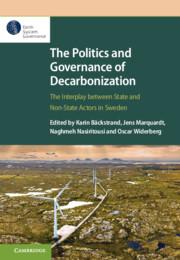Contents
1Introduction: State and Non-state Relations in Governing toward Decarbonization
2The Interplay between the State and Non-state Actors in the Governance of Decarbonization: An Analytical Framework
3Sweden’s Emissions and Climate Policy in an International Context
4Politics and Governance of Sweden’s Transformation toward a Fossil-Free Welfare State
5Climate Networks to the Rescue? Exploring Stakeholder Perceptions of the Effectiveness of Collaborative Climate Governance
6All Aboard? Inclusiveness in Collaborative Governance among Swedish Municipalities
7Zeroing In on Cities: The Politics of Aspiration and Delay in Net-Zero Emission Targets of Swedish Municipalities
8In the Shadow of an Oil Refinery: Narrating Just Transitions in the City of Lysekil
9Turning a Crisis into an Opportunity? How Swedish Climate Networks Navigate through Crisis
10The State and Collaborative Climate Governance: Prospects and Limitations

